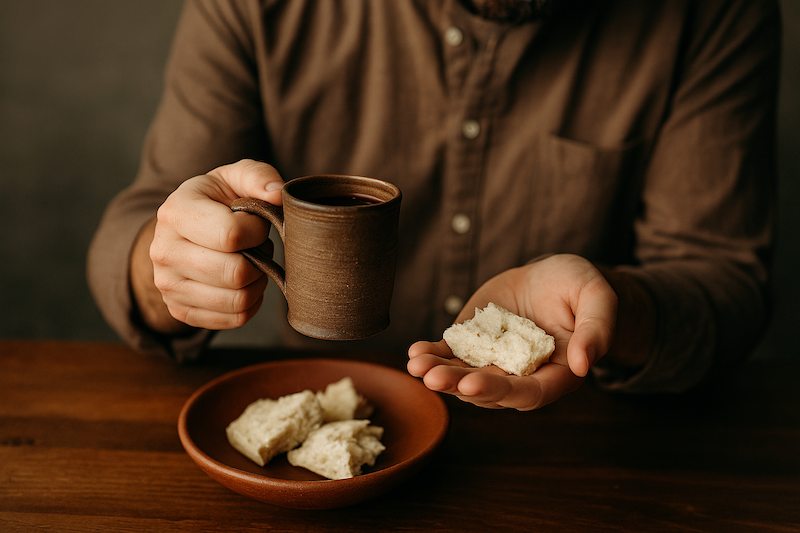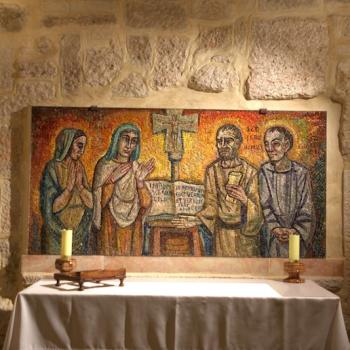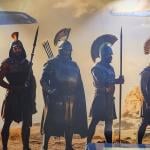
When I was growing up, the Lord’s Table—also called communion, the Eucharist, or the Lord’s Supper—often felt more like a tradition to observe or a ritual to endure than something revolutionary. Even after I returned to the church following a season of spiritual searching, I found beauty in the practice, but I wouldn’t have called it otherworldly.
Over the years, I have come to see this simple moment as profoundly significant. The Lord’s Table tethers us—not just to the story of Jesus, but to the Kingdom of God breaking in, and to the Kingdom collaborators gathered beside us. It’s not a ritual; it’s a realignment and reorientation to the sacrificial love of Jesus. This is a discipline that draws us back to what truly matters: Christ’s deliverance, faithfulness, and transformed way of being. In this post, we see it as a promise of trust—a quiet declaration that we can entrust our past, present, and future to the One who gave Himself for us.
As we shared the bread and cup, I reflected on the beauty of this communal discipline. I believe this discipline has a little more mysterious transformative power than perhaps many Protestants and Evangelicals have often given it credit for. The discipline of the Lord’s Table is rooted in meaning, it transforms, and it is an act of worship. The Lord’s Table isn’t just a ritual; it’s a reorientation. It roots us in a different story than the one we’re fed daily by the world’s noise. This practice, old as the early church, still speaks a deeper truth into our lives today.
This is the Lord’s Table Series
In this blog series, This is the Lord’s Table, I want to explore some of the revolutionary ways the Lord’s Table can serve as a quiet act of resistance in a world that is loud, chaotic, and overly consumer-driven. There are many layers to this sacred practice—ways of living, seeing, and being transformed at the Table—that I look forward to unfolding together.
The Lord’s Table Roots Us In a Story Bigger Than Ourselves
The Lord’s Table is a communal practice rooted in the Passover, where Jesus proclaimed himself as the fulfillment of God’s provision. Passover reminded God’s people of their story: how God worked in the past, present, and future. One Rabbi notes that it’s like entering the story to personally rejoice in liberation from Egypt. Our small stories meet a very big story of God’s past, present, and future at the Lord’s Table. And in the act of remembering, we learn to trust again—that God’s story can hold ours, even the broken parts.
As people who live on this side of the cross, we also remember that the Lord’s Table calls us into the transformed reality from the resurrection. The Lord’s Table is a bigger story than us because the Lord’s Table calls us to remember how God gave us freedom from our sins and wrongs through Jesus’ death and resurrection. As a result, we step into victorious living, where death and physical reality do not define us. We learn to walk victoriously at the table. At the table, we are learning to confess that though we were once lost, we are now found. However, we are also called to be the good news that God has come and offers deliverance from this world and the way it holds grip on us, to others.
We can trust the future of the story Jesus is writing, because we know the past.
The Lord’s Table Roots Us In Community.
The Lord’s Table also roots us in community. And in true community, especially one formed at Christ’s table, we relearn how to trust—God, others, and the grace that binds us together. The Church is Christ’s body—those who have faith in Christ—where no differences separate us. Paul warns against divisions, urging humility as we approach the Lord’s Table. At the table, we remember we are all one family, with Christ at the head. No sin or difference makes one person better or worse than another, as Paul told the Roman church. We are given God’s approval through Jesus’ sacrifice and are called to extend that same affirmation to each other.
The early church took this seriously: “The disciples were devoted to the teachings of the apostles, to fellowship, to the breaking of bread, and to prayer.” The Didache, a writing from around 55 A.D., teaches that the church should practice this each time they gather, but also practice confessing their brokenness and disunity before approaching the Lord’s Table. The table brought them closer to God, and to each other as a confessional community.
The Didache also offers hope for the community we are rooted in. The community we are part of is more than just our local gathered body of Jesus followers. The Didache says that just as Jesus broke the bread on the mountainside during the feeding of the 5,000, He brought the people of the hillside together in him. It also says that the day is coming when the broken pieces of bread (the church that is in Him) will be gathered again from across the globe. The Lord’s Table is a reminder of this story and truth: we remember the larger global Church community we are part of, and we remember all they are wrestling with and through. As we break the bread, we recall that Christ’s body was broken for us, and so someday, like Christ, we will be made whole and gathered into God’s Kingdom from the ends of the earth, where we will experience the glory and power of Jesus Christ forever. However, it won’t just be us and those we gather with regularly; it will be the global church. There is a day coming when all who pull a chair up to the table will sit at it together, and we must remember and pray for them.
Mark’s Account of the Passover Story
In Mark 14:12–28, Jesus gathers with his disciples for Passover, a practice that we now call the Last Table. Jesus sends a couple of his disciples ahead with some unusual instructions, but they find everything is already prepared—just as Jesus said it would be. Around the table, he talks about betrayal, but unlike other Gospel accounts, Mark doesn’t call out Judas by name. It’s almost like he wants us to sit with the weight of it ourselves—because, honestly, they all end up falling short. This is one of the important parts to notice in Mark’s account. Mark highlights how, in their fear and insecurity, they all fell short and failed Jesus. We are remembering this same need for confession at the Lord’s Table.
The key difference between Peter’s failure and Judas’ is that Peter found his way back through confession. At the Table, we practice confessing and realignment. Jesus breaks the bread, shares the cup, and ties it all to his coming sacrificial journey to the cross. There’s an obvious somber tone here, but no big speeches. No foot-washing. There is just a quiet, heavy moment filled with layers of meaning. Before they head out, Jesus promises they’ll scatter but also assures them that he’ll meet them again in Galilee. Even in the mess, there’s a promise of restoration—and that’s what sticks with me. The Table keeps us transformed in the restorative mercy and grace of God.
We eat the bread in remembrance of his sacrifice. The Lord’s Table reminds us that Christ is the ultimate sacrifice, freeing us from the power of sin. We walk from the table, being liberated from our sin, and the reminder to help others realize this liberty. This liberation invites us to live with open hands and trusting hearts—trusting that the same grace we receive is enough for us and for others.
Then he took a cup, spoke a prayer of thanksgiving, and gave the cup to them. They all drank from it. This act brings them together, but it also binds them in a New Covenant. Jesus said to them, “This is my blood, the blood of the promise. It is poured out for many people.” Today, we continue to drink of that cup to commit to this same promise and New Covenant he has sealed. The Lord’s Table reminds us of the reconciliation Christ has made between us and God, and the new life we offer to others.
Formed at the Table: What the Lord’s Supper Teaches Us
The Lord’s Table doesn’t just help us remember—it reshapes us. It teaches us to see differently, wait patiently, trust wholly, and live more freely in Jesus and the Kingdom of God. In its simplicity, it offers repeated, sacred reminders that slowly transform how we walk with Jesus and how we live in the world. These aren’t just theological truths; they’re lived experiences that keep shaping us into people of quiet confidence and Kingdom hope. Below are a few of the formational reminders that come to the surface when we linger at the Table.
- The Lord’s Table reminds us that we come with many expectations and worries. They were worried about many things, things like who was going to prepare the feast. We, too, approach Jesus distractedly because we have many expectations and worries.
- The Lord’s Table reminds us that God has already worked out our salvation and deliverance. In the story, Jesus sends them ahead. Jesus had already worked the details out, and they found that out as they stepped forward in faith. We, too, are being reminded that Jesus is working together with our salvation and deliverance.
- The Lord’s Table reminds us that the journey may be confusing, but God’s plan is perfect. They surely thought this journey Jesus sent them on was weird; they were to find some guy they didn’t know and just tell him that Jesus told them to do it. Jesus often calls us forward in the same faith that feels confusing at times.
- The Lord’s Table reminds us to remember what God has done, notice what He is doing, and expect what He will do. Then they sat down to practice passover and reimagine it into the discipline we practice today. This is a practice that reminds us that God has always been faithful and will continue to do so.
- The Lord’s Table reminds us that rest and enjoyment are found with Jesus at the head of the table. I love the image of them relaxing. They approach the fourth glass of wine at the Seder meal, and they are comfortable with Jesus; they share an intimate moment, and it reminds us that Jesus invites us to pull up a chair and find relaxation with him in the uneasy moments.
- The Lord’s Table reminds us to continually examine our hearts and align our motives with God’s will. In the safe space of their time together, Jesus called them all to reflect on their loyalty and commitment, calling no one out but giving them a chance to own their own stuff.
I love how the Gospel of Mark ends this story.
Jesus says, “I can guarantee this truth: I won’t drink this wine again until that day when I drink new wine in God’s kingdom. After they sang a hymn, they went to the Mount of Olives. Then Jesus said to them, “All of you will abandon me. Scripture says, ‘I will strike the shepherd, and the sheep will be scattered.’ But after I am brought back to life, I will go to Galilee ahead of you.”
- The Lord’s Table reminds us of the future celebration of joy and restoration. There is a promise here for us that Jesus will gather with us at the table of wine again in the fullness of the Kingdom. Things will be okay again.
- The Lord’s Table reminds us to trust that Christ is always one step ahead of us. Jesus promises his disciples that he will connect with them again in Galilee. As we go from the table, remind yourself that you can trust God in the future because of what he has done in the past. He is there before you, in the place you are going.
The Lord’s Table Is Resistance
The Lord’s Table quietly develops in us a mysterious kind of resistance. In a world that constantly tells us to consume more, climb higher, and prove our worth, this practice asks us instead to receive from Jesus, to remember his victorious work, and to rest in his leading and finished work. This practice is not flashy or loud. It doesn’t demand attention. But in its simplicity, it reorders our affections. It invites us into a rhythm that resists the hurry, hustle, and hollow promises of the world around us and tethers us to the Kingdom of God and its righteousness. At the Table, we’re formed into people who live by grace, who value community over competition, and who find strength in surrender. That’s what makes the Lord’s Table revolutionary—it shapes us into citizens of another Kingdom, one bite and one sip at a time.
At the Lord’s Table, we are reminded, as N.T. Wright explains, “This is who we are. This is who we were. This is who we will be. And, coming through all of it like the strange music of the story: this is who God was, and is, and will be.” And woven through all of it—past, present, and future—is the gentle but strong invitation to trust. Trust the table. Trust the Host who sits at the table with us. Trust the story that God is still unfolding in our lives and church communities – and in the global church overall.













